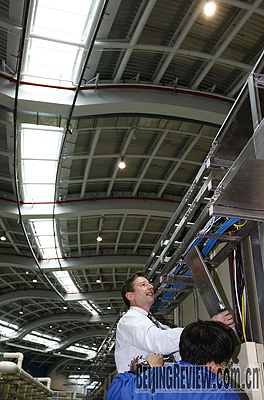| China released details in late March of the country's plan to attract elite researchers working overseas by offering top salaries and attractive funding in a number of fields.
 |
|
AIMING HIGH: A foreign expert works on the Shanghai Synchrotron Radiation Facility, a key science project expected to be finished in April (PEI XIN) | A spokesperson with the Organization Department of the Communist Party of China (CPC) Central Committee explained the new project, which was first announced in December 2008 and called the "Thousand-Person Program."
According to the spokesperson, eligible candidates will be 55 years old or younger, and the government will consider any nationality. Candidates will be required to stay in China for six months or longer per year, will need to have an academic title equivalent to professor or will currently work as senior managing staff within a well-known international company or banking institution.
China is also looking for candidates who have developed technologies and patents and those who have set up their own businesses abroad. They should be familiar with international rules in their industries.
Besides the Thousand-Person Program, the government is also hoping to attract overseas talents at different levels to work in China, according to the official. Candidates who do not qualify under the stringent requirements of the plan can apply to the Chinese Academy of Sciences' Hundred-Person Program, the Ministry of Education's Yangtze River Scholar Program, the National Natural Science Foundation's National Science Fund for Distinguished Young Scholars and other talent-attracting programs being offered by different departments, provinces, autonomous regions and municipalities.
Application and evaluation
The Thousand-Person Program is based on four subject areas: national innovation projects; key scientific subjects and key laboratories; state-owned enterprises and banking institutions; and hi-tech parks.
According to the spokesperson, the basic application process is as follows:
First, recruiting organizations will apply to the appropriate departments. Overseas talents will provide their certifications, including scientific research achievements and their tentative plans after arriving in China, including work goals, plans and innovations they hope to make.
Second, the government departments will organize experts to evaluate candidate materials. The Ministry of Science and Technology will evaluate national innovation projects. It will also work with the Ministry of Education to evaluate key scientific subjects and laboratories. The State-owned Assets Supervision and Administration Commission of the State Council and the People's Bank of China will consider those applying for state-owned enterprises and banking institutions. The Ministry of Science and Technology and the Ministry of Human Resources and Social Security will evaluate talents with entrepreneurial skills.
Third, the Organization Department of the CPC Central Committee and relevant departments will organize a special team to attract overseas high-level professionals and provide the final evaluation and authorization to successful candidates.
Those who are eligible can also send their applications directly to the Ministry of Human Resources and Social Security, the State Administration of Foreign Experts Affairs, the All-China Youth Federation, the China Association for Science and Technology and the Western Returned Scholars Association.
Working and living conditions
To attract high-level professionals abroad and bring their talents fully into play, China has made special rules that require recruiting employers to provide good working conditions to those who come from overseas to work, the spokesperson said.
Employers can appoint new hires to be leaders of colleges, research institutes, state-owned banking institutions or government-funded key research programs.
Those who come to work also have the chance to be leaders of such programs as national key scientific research and the National Natural Science Foundation. They can apply for research and industrial development funds supported by the Chinese Government. They can attend all kinds of academic organizations in China and apply to be an academician (non-Chinese academician) of the Chinese Academy of Sciences or an academician (non-Chinese academician) of the Chinese Academy of Engineering. They can be candidates for all different kinds of government awards.
Besides good working conditions, employers and the government will provide convenient living arrangements for overseas high-level talents, according to the spokesperson.
Non-Chinese professionals and their families can apply for the Alien Permanent Residence Certificate or multiple-entry visa that is valid for two to five years. Those with Chinese citizenship can choose any city as their homes without any limits. For all professionals from abroad, the Central Government will offer each 1 million yuan ($146,000) in untaxed subsidies.
In addition, they and their families will also be able to enjoy social security benefits like medical care and pensions.
The Overseas Students and Experts Service Center, under the Ministry of Human Resources and Social Security, will open special service windows to help professionals handle paperwork and getting settled, including the Alien Permanent Residence Certificate, household registration and schooling for their children, according to the spokesperson.
| 